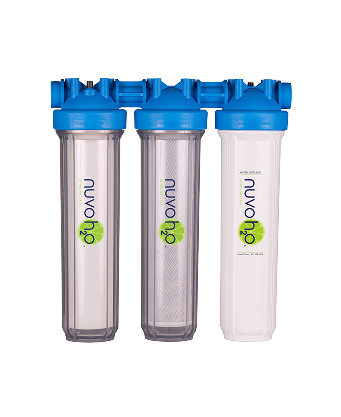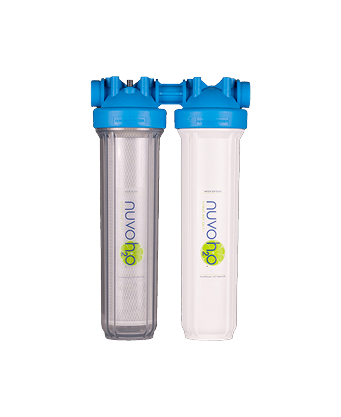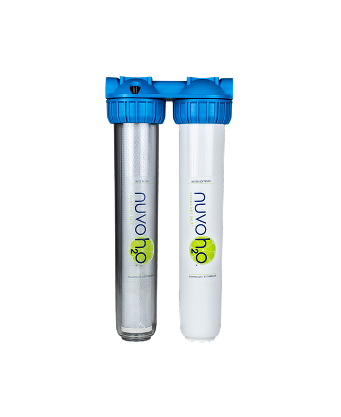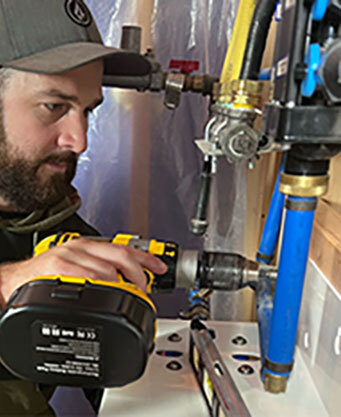
Reverse Osmosis vs. Salt-Free Water Softeners
15th Apr 2025
Reverse Osmosis vs. Salt-Free Water Softeners
When it comes to ensuring your home has clean, safe, and soft water, there are a few filtration systems to choose from. Two popular options are reverse osmosis (RO) and salt-free water softeners, like the Nuvo Manor Trio.
But how do they compare?
In this article, we'll explore how each system works, its pros and cons, and which might be the best choice for your household.
What Is Reverse Osmosis and How Does It Work?
Reverse osmosis is a water filtration process that uses a semi-permeable membrane to remove contaminants from water. It’s particularly effective at removing particles such as chlorine, lead, pesticides, bacteria, and other harmful substances. The water is pushed through a series of filters, with the final step being the membrane, which removes most contaminants.
How does reverse osmosis work?
Simply put, water is forced through a filter that only allows clean water to pass through. The contaminants are left behind, often flushed away as wastewater. This makes it one of the best systems for drinking water, as it purifies water to a high standard.
Pros and Cons of Reverse Osmosis
Pros:
- Highly Effective Filtration: Reverse osmosis removes a wide variety of contaminants, from chemicals to bacteria.
- Improves Water Taste: By removing chlorine and other chemicals, it leaves you with fresher-tasting water.
- Low Maintenance: Filters need to be replaced only once or twice a year, making it relatively low maintenance.
Cons:
- Water Waste: An RO system can waste up to three gallons of water for every gallon of water filtered, which can be a concern in areas with water scarcity.
- Removes Beneficial Minerals: RO systems remove contaminants and beneficial minerals like calcium and magnesium, which can affect the water's taste and pH.
- Lower Flow Rate: Since RO systems filter water slowly, they may not be suitable for large households or high water demands.
How Does the Manor Trio Filter Water?

The Nuvo Manor Trio is a salt-free water filtration system designed to handle multiple water quality issues in one system. It uses a three-stage filtration process that tackles contaminants and softens water without the need for salt.
- Stage 1: A sediment filter removes large particles like sand, rust, and dirt.
- Stage 2: An iron and heavy metals filter tackles contaminants such as chlorine, sulfur, and metals like iron.
- Stage 3: A salt-free softening cartridge prevents hard water scale and removes any existing scale build-up.
This system improves water taste and smell while also addressing issues related to hard water, such as mineral build-up in pipes and appliances.
Comparing Reverse Osmosis vs Manor Trio: Which is Best?
Now that we've covered how both systems work, let’s break down the main differences between reverse osmosis and the Nuvo Manor Trio.
Filtration Technology:
- Reverse Osmosis: Uses a semi-permeable membrane to remove a wide range of contaminants, including bacteria, chlorine, lead, and more.
- Manor Trio: This system filters hard water, iron, and metals and uses a salt-free softening process. However, it doesn’t provide the same level of contaminant removal as reverse osmosis.
Cost:
- Reverse Osmosis: An RO system's initial cost is typically higher, and ongoing maintenance costs (filter and membrane replacement) can add up.
- Manor Trio: This is generally a more affordable option with lower maintenance costs over time. There’s no need to buy salt, and the filters last longer than RO systems.
Household Size and Capacity:
- Reverse Osmosis: Works best for smaller households or as a point-of-use system (like under the kitchen sink). Due to its slower filtration rate and water waste, it might not be ideal for large families with high water consumption.
- Manor Trio: Designed to handle larger households, as it’s a whole-home filtration system. It’s perfect for families who want clean, softened water throughout their home without additional systems.
Durability, Installation, and Maintenance:
- Reverse Osmosis: Installation can be tricky, and the system requires periodic maintenance (filter and membrane changes). It also wastes more water than it filters, which can impact efficiency.
- Manor Trio: Easier to install, especially if you’re looking for a whole-home solution. It requires much less maintenance compared to an RO system, and there’s no waste water involved.
Which System Should You Choose?
Both reverse osmosis and the Nuvo Manor Trio have their strengths, so the best choice depends on your needs:
- Choose Reverse Osmosis if you need the highest level of filtration for drinking water and are okay with regular maintenance and water waste. It’s ideal for those with water concerns like contaminants, heavy metals, or bacteria and is perfect for smaller households.
- Choose the Nuvo Manor Trio if you want a low-maintenance, salt-free water-softening system that works for the whole home. It’s great for addressing hard water issues, like scale buildup and iron, and is more efficient for larger households.
Ultimately, the right system for you will depend on your water quality, household size, and budget. If you want pure, filtered drinking water and don’t mind some water waste, reverse osmosis is a solid choice. But the Manor Trio may be the better fit if you’re after comprehensive home water treatment with less maintenance.









